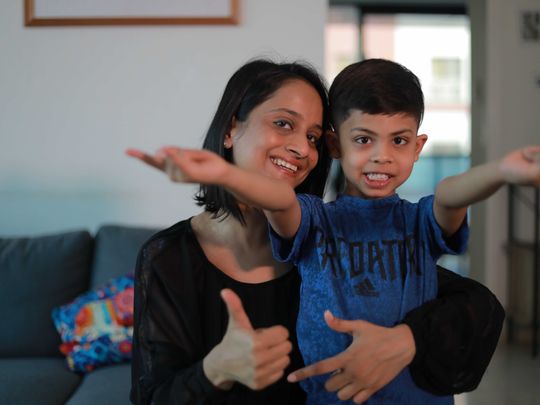
Bur Dubai-resident Anila Gonsalves’s life changed when her older son Michael was diagnosed with autism at the age of two. “We were lucky to catch it early. The principal of his nursery and day care was the first to observe it and she immediately let us know that there could be a problem. At that point in time he was not responding to his name, had no speech, and loud sounds would not deter him,” Anila says.
“I took my time to digest the news. There were a lot of sleepless nights, crying and thinking how do I fix it?”
Acceptance was maybe the easy part, as the journey ever since then has been one long roller coaster ride. “Results were not always evident and were definitely not immediate. Costs for therapy also did not make it easy to trial or choose what was best for him. But thankfully in a country like the UAE, the government helps lift the pressure from the parents with its various initiatives.”
As a mother, she admits she is learning every day to persevere and be patient. “The support I have received along the way has also been immense” says Anila.
At the time of Michael’s diagnosis, Anila met many experts and was advised to start with behavioural therapy for Michael. However, after a year-and-half she began to feel that Michael’s progress had plateaued. On further advice, she then looked to include Occupational Therapy (OT) and Speech therapy. OT brought a lot of intense core development that helped Michael focus better. Speech therapy, for example, continues to help him to form and vocalise various sounds and words. Michael is currently undergoing Oral Placement Therapy that helps him with his oro-motor sensory issues.
“Michael and I were attending a theatre play organised by one of the many support groups. There I noticed another child who lacked speech and used a mobile device (iPad) to communicate with his mother and others. I found this to be a novel idea and a good use of technology. I got home and researched more about it. I asked myself why this wasn’t more commonly adopted by other parents and kids who lack natural speech. That’s when I realised that cost is the main deterrent followed by a lack of understanding of how technology can be used to ones benefit.”
Technology knows no borders and should be available and accessible to everyone, feels Anila. This is what led her to work working towards with her app, Fabulaa.
Fabulaa is a digital assistive tool designed to simplify the life of those individuals who struggle with simple daily conversations. As a mobile application, it is meant be used on the go, is simple and free to download from the Google Play Store and the App Store.
So how does it work? Fabulaa as an app is inspired by Augmentative and Alternative Communication (AAC). “It has been seen that autistic individuals are more receptive to learning and communicating with visual cues. It makes learning and communicating easier and fun. This is why with Fabulaa we have combined four helpful features to assist with easier communication,” Anila explains.
Some of the few features of Fabulaa that have helped Michael is Scribble and Cards. “My son struggled with simple tasks, such as holding a pen or a pencil. His fine motor skills had not developed fully. This is where Scribble helped. Over time we realised it was easier for him to use the tip of his finger, and this is how we taught him letter formations and he learnt number formation. He has now graduated to drawing stick figures. Whenever he is cross with me or wants to convey he his upset about something, he draws a ‘X’ to communicate his displeasure to me,” says Anila.
Cards too has helped him identify images and sounds. “I have also used the images in Cards to train him to communicate basic functions, like to go to the toilet, eat food, feeling sad , feeling happy. This then helped him to vocalise a lot more with his words and sentences. We are currently using the app to teach him basic spellings, where we (parent/ teacher) uses the speech function to say a word or a sentence and he then tries to sight read the word/sentence. To be honest I’m not a technical person at all, but I can pride myself in being a solutions driven individual. Fabulaa took shape from this very premise, about finding a solution for a problem,” says Anila.
“I hope with Fabulaa, families, caregivers, teachers are able to connect with their loved ones, build bonds and tell stories.”












